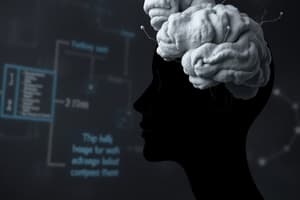Podcast
Questions and Answers
Which statement best describes the concept of classical conditioning?
Which statement best describes the concept of classical conditioning?
- It relies solely on feedback from instructors.
- It refers to learning that occurs through pairing stimuli. (correct)
- It involves learning through direct consequences of actions.
- It emphasizes the importance of social interactions.
What is the main idea behind operant conditioning?
What is the main idea behind operant conditioning?
- It emphasizes the importance of rote memorization.
- It is centered around the immediate consequences following a behavior. (correct)
- It focuses on learning that happens through imitation of others.
- It involves the gradual development of skills through practice.
What role does observational learning play in the learning process?
What role does observational learning play in the learning process?
- It combines observed behavior with hands-on experience. (correct)
- It discourages the use of real-life examples.
- It solely depends on written materials for learning.
- It enhances understanding through passive observation.
According to the content, which of these concepts captures the essence of latent learning?
According to the content, which of these concepts captures the essence of latent learning?
What does the quote 'All knowledge is connected to all other knowledge' imply about the learning process?
What does the quote 'All knowledge is connected to all other knowledge' imply about the learning process?
What does the beginner's mind signify in the context of learning?
What does the beginner's mind signify in the context of learning?
What is the outcome when a positive consequence follows a behavior in operant conditioning?
What is the outcome when a positive consequence follows a behavior in operant conditioning?
What characterizes effective hands-on learning as mentioned in the text?
What characterizes effective hands-on learning as mentioned in the text?
What is a key characteristic of informal learning?
What is a key characteristic of informal learning?
Which of the following is essential for adult learners to effectively learn new information?
Which of the following is essential for adult learners to effectively learn new information?
What approach should effective managers take when overseeing adult learners?
What approach should effective managers take when overseeing adult learners?
Why is critical reflection important in adult education?
Why is critical reflection important in adult education?
What is a primary motivator for adult learners as highlighted in the content?
What is a primary motivator for adult learners as highlighted in the content?
When designing a learning plan for adults, which aspect should be prioritized?
When designing a learning plan for adults, which aspect should be prioritized?
Which statement accurately reflects how adults differ from children in their learning habits?
Which statement accurately reflects how adults differ from children in their learning habits?
What is the potential outcome of incorporating informal learning in a workplace setting?
What is the potential outcome of incorporating informal learning in a workplace setting?
Which of the following best describes an effective method for managers to promote adult learning?
Which of the following best describes an effective method for managers to promote adult learning?
What must adult learning initiatives emphasize to guarantee effectiveness?
What must adult learning initiatives emphasize to guarantee effectiveness?
Flashcards are hidden until you start studying
Study Notes
Learning and Psychological Theories
- Emphasizes that a beginner's mind is open to many possibilities, while an expert's mind is limited.
- Highlights that learning is an ongoing process throughout life.
Classical Conditioning
- Concept involves learning through association, as demonstrated by Ivan Pavlov.
- Notably, dogs learned to salivate at a bell sound after associating it with being fed.
- Pavlov's experiments revealed the significance of pairing stimuli to elicit a response.
Operant Conditioning
- Focuses on the relationship between behaviors and their consequences.
- Follows a cause-and-effect model: BEHAVIOR > RESPONSE > RECURRING BEHAVIOR.
- Immediate outcomes following a behavior can either reinforce or diminish the likelihood of that behavior being repeated.
Observational Learning
- Involves acquiring knowledge by observing the behaviors and outcomes of others.
- Latent learning refers to knowledge gained indirectly, often utilized in training new hires alongside experienced employees.
- On-the-job training (OJT) combines observational learning with practical experience for optimal effectiveness.
Connection of Knowledge
- Quotes Arthur Aufederheide, emphasizing that all knowledge is interconnected.
- The joy in learning comes from making connections between various pieces of information.
Informal Learning Theories
- Informal learning is characterized as organic, unstructured, and learner-driven.
- A blend of formal and informal learning approaches is optimal for workplace effectiveness.
- Informal learning allows individuals to control their learning journey, fostering engagement.
Adult Learning Characteristics
- Adults require self-direction in their learning processes.
- Effective managers encourage learners to choose their focus areas to enhance buy-in and engagement.
- Critical reflection is crucial for adults when learning new skills.
- Managers should ask reflective questions rather than simply evaluating an employee's performance.
- Accessing personal experiences enhances adult learning retention and application on the job.
- A well-designed learning plan should meet adult learning needs before, during, and after the learning process.
Motivations and Goals
- Understanding unique motivations of adult learners is vital for effective learning.
- Adults often require a clear purpose for learning, focusing on practical applications like meetings, training, and supervision.
- Successful learning outcomes depend on achieving specified goals rather than learning for its own sake.
Learning as a Personal Experience
- Individuals should focus on their own learning styles and preferences for maximum effectiveness.
- Emphasizing personal growth and learning autonomy is key to retaining skills and applying knowledge effectively.
- Success in learning is measured by the achievement of the goals set by the learner.
Studying That Suits You
Use AI to generate personalized quizzes and flashcards to suit your learning preferences.




